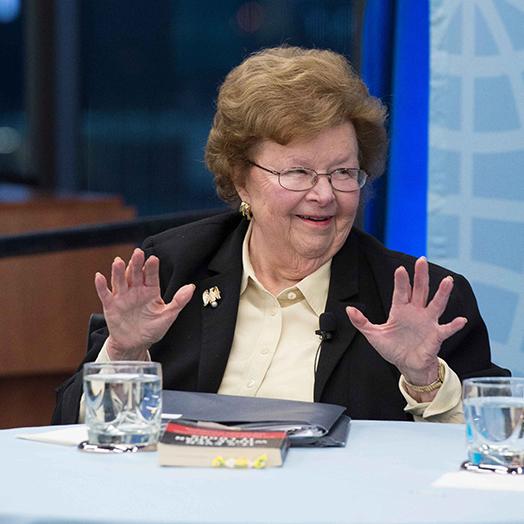
Sen. Mikulski Visits Carey
Former United States Senator from Maryland Barbara Mikulski spoke at the Johns Hopkins Carey Business School on Nov. 13, addressing a host of topics ranging from women’s leadership to the economy in a lively one-on-one discussion with Carey Dean Bernard T. Ferrari.
Mikulski, now a Homewood Professor of Public Policy, and Ferrari sat for a fireside-style Q&A at Carey’s Harbor East Campus attended by approximately 100 Johns Hopkins University students, staff, faculty, and guests. In her trademark matter-of-fact and animated style, Mikulski spoke on a wide range of issues, weaving in anecdotes and insights from her political career. Below is a video of the event.
Business as Change Catalyst: When asked to critique the strengths and opportunities of business that future leaders should examine, Mikulski said business was good at creating and adapting technological change but slow on the uptake for social progress.
“For business to really succeed, it has to look at the new democracy – that more women are coming to work, the fact that we have a very diverse society and are moving toward a majority black, brown country. … the welcoming of LGBT people – it’s a changing democracy,” she said. “I think business has to look at it and be a force for society. Society is open, so should opportunity be.”
Later on this topic, Mikulski said the strongest push should come from within an organization – not from the government– and that reforming the tone for corporate culture is set at the top.
“Culture trumps rules, regulations and so on. How does [your business] create a positive culture that is welcoming, inclusive, and that looks at talent?” she said. “That is going to be driven by the board of directors and shareholders.”
Women’s Leadership: Mikulski said one of the keys to addressing the dearth of women in leadership roles in both the public and private sector is identifying and developing talent. As she recounted her rise from a community organizer to the Baltimore City Council to the Senate, Mikulski touted the importance of resilience.
“We heard ‘no’ so often in our life, but we took every ‘no’ and turned it into a ‘yes’,” Mikulski said recounting the challenges she and others faced denting the glass ceiling.
She also dispatched gender-neutral advice on the topic of allies and mentors, saying, “A lot is written about mentors. … And they are really, really important. But you need a champion.”
Greatest Economic Risk: Mikulski said the biggest risk to the U.S. economy is also a national security issue: international trade. Touting the importance of trade, Mikulski said she is not in favor of multilateral trade agreements, but instead is “a bilateral trade agreement gal.”
On the topic of her concerns, Mikulski said political efforts to renegotiate trade agreements are “putting into tatters international security agreements and international trade agreements, and we are wrecking our relationships with allies that have been built over years. And I think business should raise hell about it.”
Mikulski visited Carey as part of the school’s Leaders+Legends speaker series. Her visit is also part of a series of events focusing on women’s leadership. In October, Carey hosted a three-day conference called “Broadening Perspectives on Women in Work: An Interdisciplinary Conference.” Featured at that event was an Oct. 13 panel consisting of top women executives from Apple, BNY Mellon, IBM, and Johns Hopkins Hospital. On Oct. 24, Carey’s Women in Business Club hosted female leaders from Johnson & Johnson for a panel and lunch.